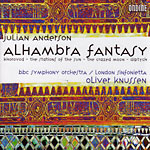Perhaps the best way for new-music neophytes to approach Julian Anderson’s music is to pretend that the first piece they ever heard was Stravinsky’s Rite of Spring, freeing themselves of expectations set up by years of hearing Mozart, Beethoven, Brahms, and Tchaikovsky. I say this in recollection of a concert by the New York Philharmonic of John Adams’ very tonal, but not necessarily tuneful, Harmonienlehre, during which many older patrons departed in befuddlement after the first movement. Interestingly, it’s often non-classical listeners who can most readily appreciate new works, as their ears have been shaped by rock, pop, jazz, and hours of often modernist film music, whether they were consciously listening or not. To them, new “classical” music shares with pop the quality of being in tune with the times.
As with many of his contemporary composer colleagues, Julian Anderson writes tonal music, in the modern sense. Again, you won’t always hear tunes, but there are distinct tonal centers, however brief they last during the constantly shifting aural canvas. I hesitate to use the much abused term “accessible”, but it’s appropriate here because attentive listeners can “get” Anderson, regardless of their musical training. This is largely due to the composer’s desire to communicate to his audience, a trait Anderson clearly exhibits in his vibrant and exciting music, which is ablaze in vivid colors and exuberant orchestral effects. But there’s also the evocation of feeling throughout, despite the unfamilar sound world. And you always can sense a creative mind freely expanding and exploring, unfettered by dogmatic modernist strictures.
The longest work on this well-filled disc, and for my money the most fascinating, is The Stations of the Sun, which, though based on folk-customs celebrating the seasons, evokes visions of other worlds and is especially affecting in a transcendent central passage that acts as a calm oasis between the frenzied outer sections. Khorovod, a shimmering, glittering fantasia based on a Russian round-dance, seemingly takes Stravinksy’s Song of the Nightingale as its launching point. But there’s a good deal of John Adams-style minimalism in the mix as well. Indeed, Adams comes quite strongly to mind in Alhambra Fantasy. This is not to suggest that Anderson’s music is overtly derivative–only that he operates in the same stylistic milieu as the other composers, who as a group are crafting a distinctive 21st-century sound.
Even with the aforementioned tonal centers, Anderson’s music is not easy listening; it requires focused attention and a willingness to let the music pour over you. And lest you get the wrong impression, Anderson is not always especially tonal. The Crazed Moon has more gray than color, but it remains intriguing for its cinematic atmosphere. The earliest piece, Diptych, is harmonically the most astringent, although the language serves the form, and Anderson’s stunning orchestral technique assures that the ear and mind are continually stimulated.
Oliver Knussen, a formidable composer himself, conducts Anderson’s music with passion and conviction, drawing virtuoso playing from the London Sinfonietta (Khorovod, Alhambra Fantasy) and the BBC Symphony Orchestra (all the rest). Ondine’s recording emphasizes the higher frequencies, making Anderson’s music sound exceptionally bright, but this hardly detracts from the enjoyment of this marvelous disc.
































